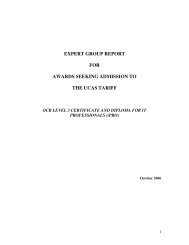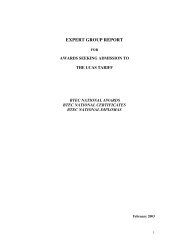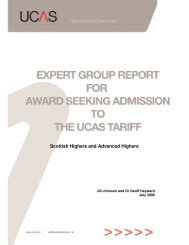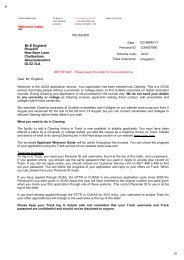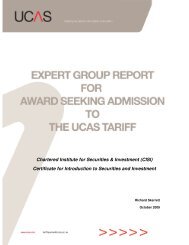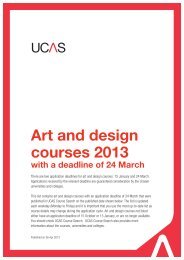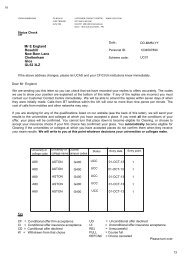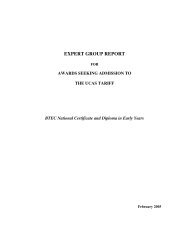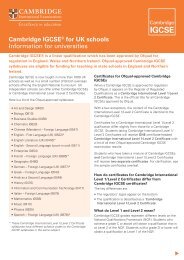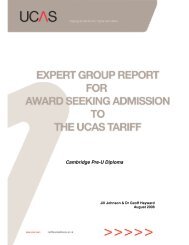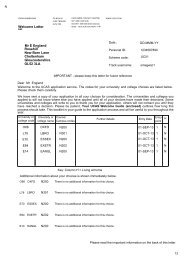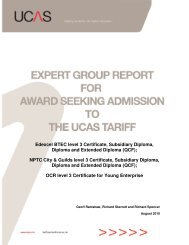International qualifications 2013 (pdf) - CUKAS
International qualifications 2013 (pdf) - CUKAS
International qualifications 2013 (pdf) - CUKAS
You also want an ePaper? Increase the reach of your titles
YUMPU automatically turns print PDFs into web optimized ePapers that Google loves.
Qualifications currently offered<br />
EDUCATION SYSTEM<br />
Education is compulsory for children from the age of six to 16,<br />
which includes six years of primary and three years of lower<br />
secondary education. On completion of three years of secondary<br />
education (junior cycle), the Junior Certificate is usually taken,<br />
and the Leaving Certificate after a further two or three years of<br />
study (senior cycle). The Junior Certificate is below GCSE<br />
standard and is not used by the Irish universities for entrance<br />
purposes. The Leaving Certificate is examined at two levels that<br />
are used for the purposes of selection to higher education,<br />
Ordinary and Higher. In general, the standard is somewhere<br />
between GCSE and GCE A level. Pupils normally take six to nine<br />
subjects, of which six or more would usually be at Higher level in<br />
the case of potential university candidates. Instruction in postprimary<br />
schools is in English and Irish. Study of the Irish language<br />
is compulsory but students are not required to take an<br />
examination in the subject.<br />
A variation of the Leaving Certificate is the Leaving Certificate<br />
Vocational Programme (LCVP) which concentrates on technical<br />
subjects with additional vocationally focused modules. An<br />
alternative to these is the Leaving Certificate Applied Programme<br />
(LCA) which is a stand-alone pre-vocational programme designed<br />
to prepare students for working life through a two-year crosscurricular<br />
course. Certification in the LCA is not recognised for<br />
direct entry to HE courses.<br />
Further education is the responsibility of the Further Education<br />
and Training Awards Council (FETAC). FETAC offers a range of<br />
<strong>qualifications</strong> at levels 1-6 of the Irish National Framework of<br />
Qualifications. See www.fetac.ie for details.<br />
ACCESS TO HIGHER EDUCATION<br />
Admission to university studies in Ireland is predominantly on the<br />
basis of the Leaving Certificate examination taken after 13 years<br />
of schooling. The minimum entry requirement of the four<br />
constituent universities of the National University of Ireland (NUI)<br />
is six subjects, including Irish, English and a third language. In<br />
certain circumstances, students can claim exemption from the<br />
Irish and third language requirements. Further information about<br />
exemptions can be found on the NUI website at www.nui.ie.<br />
There are variations between institutions but, in general, a<br />
minimum of grade C3 at Higher level in two subjects is required<br />
(three subjects in the case of Trinity College Dublin) and a<br />
minimum of grade D in other specified subjects, including<br />
mathematics in the case of the three non-NUI universities. The<br />
supply and demand situation between university courses is<br />
broadly similar to that in the UK. Overall demand exceeds supply<br />
in certain disciplines and competition is strong. This is reflected<br />
in stringent entry requirements for areas such as medicine and<br />
law, which may involve five or six passes at grade A in Higher<br />
level subjects.<br />
In practice, a rank order of candidates who satisfy eligibility<br />
requirements is established by converting Leaving Certificate<br />
grades for the six best subjects into a points score. A detailed<br />
system, with possible additional bonuses, awards 100 points<br />
for grade A1 at Higher level and 60 points for grade C3. On<br />
this basis, examples of minimum levels at which places were<br />
offered in 2012 include: University College, Dublin – veterinary<br />
560, law 485, Trinity College Dublin – dental science 570, and<br />
University of Limerick – languages, literature and film 355,<br />
applied languages 460. University admission may also be<br />
obtained on the basis of the Higher Certificate* or Ordinary<br />
bachelor’s degree* awarded by the Higher Education and<br />
Training Awards Council (successor to National Council for<br />
Education Awards – NCEA), which are broadly comparable to<br />
the corresponding BTEC awards. Applicants over 23 years of<br />
age may seek admission on the basis of curriculum vitae.<br />
* These awards were formerly known as the National Certificate<br />
and Diploma. The terminology has now been changed under the<br />
National Framework of Qualifications.<br />
Israel<br />
EVALUATION<br />
Bagrut<br />
Acceptable as a group qualification satisfying general entrance<br />
requirements.<br />
GRADING SYSTEM<br />
10 excellent<br />
9 very good<br />
8 good<br />
7 above average<br />
6 average<br />
5 below average<br />
4 – 1 fail<br />
Successful candidates must take a minimum of 20 study units in<br />
seven required subjects and in additional optional subjects. The<br />
required subjects are: Hebrew/Arabic, literature, bible, civics,<br />
history, English and mathematics. The additional optional<br />
questions are selected from prescribed lists, at least one of which<br />
must be a five-unit subject. At least one option must also be a<br />
general culture subject. Students must receive at least an<br />
average grade in physical education and must not receive more<br />
than one grade of 5 or below, and this is not permitted to be in<br />
Hebrew or Arabic.<br />
EDUCATION SYSTEM<br />
Six years of primary education are followed by three years of<br />
lower and three years of upper secondary schooling. The medium<br />
of instruction is Hebrew or Arabic. There is some specialisation in<br />
the final two years. Although eight is the minimum number of<br />
subjects taken in the Bagrut examination, in 12th grade, the<br />
number may be higher. Pupils can take a subject at one of three<br />
levels, basic, normal and high points/units. The Matriculation<br />
Certificate is then awarded based on the Bagrut examinations.<br />
Since the establishment of the Palestinian Authority pupils on the<br />
West Bank (Judea and Samaria) and on the Gaza Strip take the<br />
Palestinian Matriculation Certificate.<br />
ACCESS TO HIGHER EDUCATION<br />
The Matriculation Certificate is the basic requirement for<br />
admission to HE in Israel. In practice, however, considerably more<br />
than the minimum points are needed for university entry.<br />
Minimum required points/units in English is 4 points/units.<br />
University applicants must pass the nationally administered<br />
Psychometric Entrance Examination (a multiple-choice aptitude<br />
test), have proficiency in Hebrew, and in some cases be<br />
interviewed. The bachelor’s degree normally lasts three years but<br />
is longer for professional specialisms (such as engineering and<br />
similar BSc degrees).<br />
INTERNATIONAL QUALIFICATIONS 31



